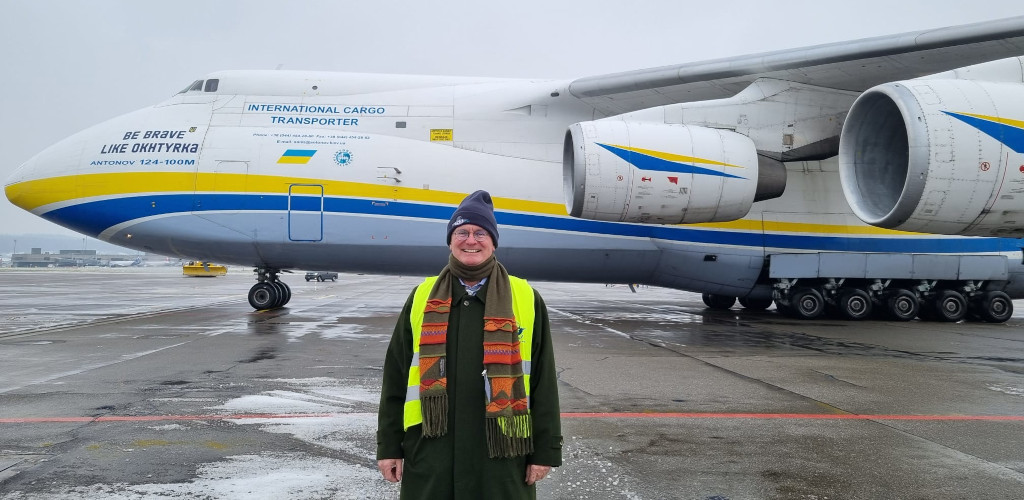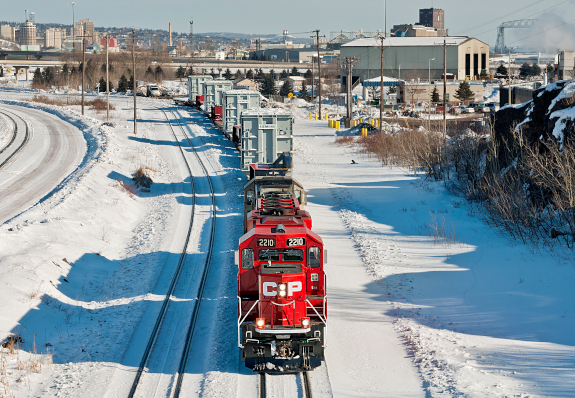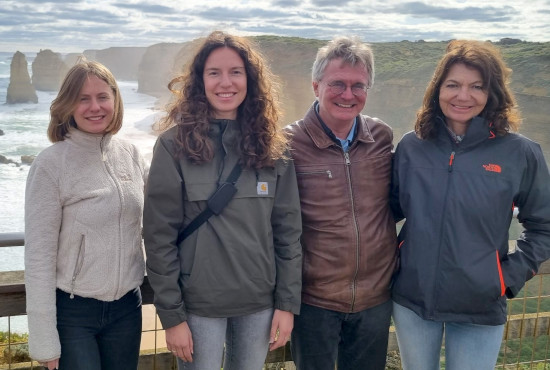Fracht’s Owner on the Importance of Making a Decision and Staying One Step Ahead

By Luke King
Breakbulk sat down with Ruedi Reisdorf for lunch near Fracht’s headquarters in Birsigstrasse, Switzerland, to learn more about the Basel-based executive's unique way of doing business.
From Issue 3, 2024 of Breakbulk Magazine.
(8-min read)
For serial dealmaker Ruedi Reisdorf there’s only one transaction that’s off the table. “Fracht is absolutely, definitely not for sale, nor will it ever be,” Reisdorf emphatically declares. The Basel-based executive is the owner and sole shareholder of Fracht AG – one of a rare breed of independently-owned project forwarders with a truly global footprint.
Despite having snapped up a string of other logistics companies, the animated freight forwarder simply can’t countenance the sale of his own. “What should I do with the money? Buy another forwarder? It wouldn’t be as good as our company!” There’s no hint he’s joking.
Fracht was established by his late father (and namesake) in 1955 and the younger Reisdorf attributes its success – it employs over 2,000 people and has more than 150 offices around the world – to its financial discipline, coupled with a willingness to act. “We have an extremely long-term view because I’m the sole owner. I keep the money in the company, so there is just a focus on business development and not, let’s say, on taking out money and satisfying shareholders.
“That would complicate matters because the more shareholders you have, the more opinions you have, the longer it takes you to get a decision. At Fracht, we don’t get every decision right, but we take them extremely quickly. I think it was somebody from ABB that told me, you can make wrong decisions – but you have to make decisions. The worst thing is to do nothing.”
Born in Basel in 1961, Rudolf Hans- Peter Reisdorf says he was “born into freight forwarding” as “it was clear to my father and to me” that he would be the successor. “I became a real freight forwarder because I was trained on the job. I’ve been in the ports, I spent time in the countries where we had the transports when I was young, especially in the Arab world. So, I’ve been one year in Libya, one year in Kuwait, two years in Saudi Arabia, getting the generators out of the ports, doing customs clearance, loading of trucks, supervising, dealing with the different cultures.”
In the beginning, Fracht’s number one market was Switzerland, and Reisdorf remains proud of the company’s Swiss heritage. “In the early days you had pharmaceutical companies, of course, but also industrial clients like Brown Boveri & Cie of Baden, later ABB, which was with us more or less from the beginning.
“ABB later became part of Alstom Power, then General Electric, and the ‘Swissness’ was slowly diluted over time. Engineering moved out of Switzerland because of the high costs. Switzerland used to be our absolute number one market, now it’s maybe number four or five.
“Despite that, Switzerland still has a very good reputation abroad. I would say this reputation was better before – Switzerland made some mistakes like with Swissair, which became Swiss and part of Lufthansa, or Credit Suisse’s recent disaster – but in general, you have no closed doors being Swiss.”
International Expansion
 Fracht’s international expansion began with Reisdorf’s father in the 1970s. “We started with Germany, and then the United States and China and so on. It accelerated over time but until about the year 2000, we were still a regional freight forwarder. We had maybe 30 or 40 offices, so we were still medium-size. Now you can say we are a multinational company. And of course, that put us onto the radar of the very big companies.”
Fracht’s international expansion began with Reisdorf’s father in the 1970s. “We started with Germany, and then the United States and China and so on. It accelerated over time but until about the year 2000, we were still a regional freight forwarder. We had maybe 30 or 40 offices, so we were still medium-size. Now you can say we are a multinational company. And of course, that put us onto the radar of the very big companies.”
Fracht’s focus on project cargo – today it generates around 50 percent of the company’s turnover – was also instigated by his father. “In the end, you had to carry him out,” the younger Reisdorf reminisces. “In his last days he was not ‘working’ anymore, but he was coming to the office because it was his baby. He stopped coming at the age of 89.
"Sometimes I think the younger generation lacks a little bit because they’re not traveling as much as the older generations did, they don’t want to get their hands dirty. Maybe they want to go to a nice office in Singapore, but they don’t always want to go somewhere less appealing.
“Young people are extremely well trained theoretically, but they sometimes lack the hands-on practice. And this, I think, our industry will dearly miss in some years, when the old experts slowly get into retirement age."
In full control of the business by 2001, Reisdorf continued the tradition of growing the business in the family’s trademark careful and considered way. “Today of course there are more opportunities than in the past, and we take them, but we don’t do what we can’t pay. As soon as you get money from the bank or other institutions, you have to report to them. Repayment will always come at the worst time, when things are not doing so well. As I say, we make quite substantial investments, but we pay them ourselves.
“And as we are profitable, we can invest every year, let’s say, again and again and again.
“It’s more or less the same strategy as my father, though he was quite prudent. They say the older you get, the less risk you take. Well, I can say I’ve not yet come to that age.”
One of Fracht’s major acquisitions was that of Polytra BV, a reputed Belgium forwarder with a large network in Africa. Following the sale in 2018, Reisdorf was thanked by Polytra owner Maurice Velge for his “very professional negotiations” and for fostering “a climate of mutual trust” during the transaction.
“That was a typical Fracht takeover,” recalls Reisdorf. “Baron Velge had a son, but the son did not want to run the company and so he was looking for the company that best follows the values of his business. And we did the deal really in an old-fashioned way, with a handshake. Our contracts are two or three pages, no more. And what is important, you have to know that the one you’re dealing with is also a gentleman.
“Everything was respectful and professional and the deal was smooth. This is the way we are doing business. We had the same experience a bit earlier in Brazil, with the company Nuno Ferreira, as Mr. Ferreira also had a son who did not want to continue.
“When you know the seller, you know they run a good company. You are really buying people and when they know they will get an environment which is at least as good as what they’re used to, then they stay with you.”
Early Riser
As a media representative, I’ve been calling on Fracht for a decade but this is the first occasion I’ve been invited to Reisdorf’s cavernous personal office, which is kitted out with oriental rugs and assorted keepsakes from his world travels.
The Swiss cuckoo clock chimes early in the Reisdorf household and the Fracht boss’s 12-hour working day begins in the office at 6 o’clock. “The first thing is emails, then meetings,” he says. “There are generally only two things on my table: problems and opportunities, both of which cost money. Once we decide to act on an opportunity, fortunately it disappears from my desk.”
Over lunch at the Schützenhaus, a converted 16th century rifle lodge a short stroll from Fracht headquarters in Birsigstrasse, Reisdorf is greeted like a regular customer and our conversation turns to his personal interests. “I do sports – I’ve tried them all, but alas there’s no extraordinary talent. Despite that, I do a lot of cycling and general fitness in the gym, and I enjoy skiing trips. I love to travel – there are not many countries that I have not seen and, of course, during holidays I take the chance to meet some business friends.
“I love old cultures and history and I find it very sad how little we have learned from history. Sometimes, it seems we’ve learned nothing. I doubt there are many people in the world who have seen more temples, churches and other historic places.
“I watch crime stories and sports on television and I go to the stadium now and then for concerts. I also enjoy participating in the Basel carnival.” (The carnival is the biggest in Switzerland and the main Protestant carnival in the world.)
“I should also mention that since the beginning of our company, we’ve had a Fracht football club, where every Thursday we play football and have dinner with some beers.” Talk of football neatly leads to Fracht’s sponsorship of Club Internacional de Fútbol Miami (Inter Miami CF).
“You can say it’s the biggest contract we ever signed,” Reisdorf said. The cost of the sponsorship doubtless soared following the arrival of star player Lionel Messi at the club, but Reisdorf seems satisfied Fracht is getting its money’s worth. “We have some seats that we can enjoy with our customers, and the Fracht name is on the right sleeve. And of course, everybody that buys a shirt sees our logo, even those who buy one on the black market,” he jokes.
“The main thing is that the whole Fracht family around the world has one team to follow. So whether somebody is in Congo, in China or in Australia, they all watch to see how our Miami team is doing. This brings the whole company together.”
Investments
Back in the office, following a hearty lunch of veal with mushroom sauce paired with an easy-drinking red wine from the canton of Ticino, Reisdorf tells me about his hobby of investing in promising start-ups.
“I would say I study innovation in logistics in my spare time. I look at all the start-ups and what they’re doing and when I find an interesting opportunity, I invest – especially in those with a connection to logistics. I’ve invested in some of the very successful start-ups, but of course I’ve also invested in some that do not make it, both Swiss and international.
“I send an email and say, ‘Hey I read about you – your idea is really good. Do you need some more money, what are your terms?’ And let’s say within one or two weeks, I’ve either invested or not. You have to see things quickly. Whether you look at it for months, or for only for a week, you will get to the same conclusion.
“You can’t train it, but I like to think I have the ‘evil eye’ for detail, something my father also had. You look at an invoice, for example, and there’s a clue something’s wrong, so you go after it and you find it. It’s the same with companies. I mean, I look at them and there might be one word that gets my attention.”
Reisdorf says Fracht has undertaken around ten acquisitions, and made approximately 20 investments in promising start-ups. At fast-moving Fracht, due diligence is not a protracted affair. “A lot of that is based on gut. Our due diligence is extremely quick. I mean, you usually know the company anyway.”
The Future Is Female
 Barring something unforeseen, the future of Fracht will, for the first time, be in female hands. Reisdorf has a daughter and a stepdaughter waiting in the wings, both in their early 20s and currently studying logistics and international trade. “I promised my girls that I won’t stay around that long,” he quips.
Barring something unforeseen, the future of Fracht will, for the first time, be in female hands. Reisdorf has a daughter and a stepdaughter waiting in the wings, both in their early 20s and currently studying logistics and international trade. “I promised my girls that I won’t stay around that long,” he quips.
But what sort of business will they inherit? “It will actually be a completely different business,” he says. “Digitalization will be huge, but not only for logistics. I think everything we now call ‘office work’ will change with artificial intelligence. This is a new revolution, as big as the railroads 150 years ago.
“But I feel confident about that because, like everything else, it’s a new tool. If you apply it in your favor, it will bring advantages and you just have to connect it with your strengths and capabilities.”
As our interview draws to a close, Reisdorf concludes: “Where we see big potential in the future is Africa. We are already very big there – in sub- Saharan Africa, we have, I think, 25 offices in 18 countries. Okay, everybody has been talking about Africa for 40 years already and let’s say there have unfortunately been some political setbacks, especially in West Africa with the coups and the terrorism, but Africa has to rise, and will rise.
“The whole of Europe has an interest in developing Africa as well, otherwise immigration will become an even bigger issue. So we should definitely do much more in Africa. Fracht wants to be there to help, and to see that people make a good living.
“Whatever happens, we want to continue the way that we are doing business. Always adapting to new situations, and even being ahead. For example, we were one of the first forwarders to achieve ISO 9000 (in 1990). Then we did ISO 14,000 when nobody cared about the environment and we were among the first to develop a CO2 emissions calculator.
“I invested in blockchain about six years ago, so we try to be ahead because when we see things coming, why should we wait? Just do it - and then you don’t have to follow when the others are running after it."
Meet Ruedi Reisdorf and the Fracht team at Breakbulk Europe, Stand 2G34-H35.
MAIN PHOTO: Ruedi in front of an Antonov AN-124. CREDIT: Fracht
SECOND: Fracht oversees project cargo rail shipment. CREDIT: Fracht
THIRD: Ruedi and family enjoying one of many holidays around the world. CREDIT: Ruedi Reisdorf
